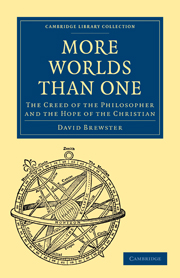Book contents
- Frontmatter
- Contents
- PREFACE
- INTRODUCTION
- CHAP. I Religious Aspect of the Question
- CHAP. II Description of the Solar System
- CHAP. III The Geological Condition of the Earth
- CHAP. IV Analogy between the Earth and the other Planets
- CHAP. V The Sun, Moon, Satellites, and Asteroids
- CHAP. VI The Motion of the Solar System round a distant Centre
- CHAP. VII Religious Difficulties
- CHAP. VIII Single Stars and Binary Systems
- CHAP. IX Clusters of Stars and Nebulæ
- CHAP. X General Summary
- CHAP. XI Reply to Objections drawn from Geology
- CHAP. XII Objections from the Nature of Nebulæ
- CHAP. XIII Objections from the Nature of the Fixed Stars and Binary Systems
- CHAP. XIV Objections from the Nature of the Planets
- CHAP. XV The Future of the Universe
CHAP. VII - Religious Difficulties
Published online by Cambridge University Press: 29 August 2010
- Frontmatter
- Contents
- PREFACE
- INTRODUCTION
- CHAP. I Religious Aspect of the Question
- CHAP. II Description of the Solar System
- CHAP. III The Geological Condition of the Earth
- CHAP. IV Analogy between the Earth and the other Planets
- CHAP. V The Sun, Moon, Satellites, and Asteroids
- CHAP. VI The Motion of the Solar System round a distant Centre
- CHAP. VII Religious Difficulties
- CHAP. VIII Single Stars and Binary Systems
- CHAP. IX Clusters of Stars and Nebulæ
- CHAP. X General Summary
- CHAP. XI Reply to Objections drawn from Geology
- CHAP. XII Objections from the Nature of Nebulæ
- CHAP. XIII Objections from the Nature of the Fixed Stars and Binary Systems
- CHAP. XIV Objections from the Nature of the Planets
- CHAP. XV The Future of the Universe
Summary
It is as injurious to the interests of religion, as it is degrading to those of science, when the votaries of either place them in a state of mutual antagonism. A mere inference or a theory in science, however probable, must ever give way to a truth revealed; but a scientific truth must be maintained, however contradictory it may appear to the most cherished doctrines of religion. In freely discussing the subject of a plurality of worlds, there can be no collision between Reason and Revelation. Christians, timid and ill-informed, have, at different periods, refused to accept of certain results of science, which, instead of being adverse to their faith, have been its best auxiliaries; and infidel writers, taking advantage of this weakness have vainly arrayed the discoveries and inferences of astronomy against the fundamental doctrines of Scripture. This unseemly controversy, which once raged respecting the motion of the Earth and the stability of the Sun, and more recently in reference to the doctrines and theories of geology, terminated, as it always must do, in favour of science. Truths physical have an origin as divine as truths religious. In the time of Galileo they triumphed over the casuistry and secular power of the Church; and in our own day the incontrovertible truths of primeval life have won as noble a victory over the errors of a speculative theology, and a false interpretation of the word of God.
- Type
- Chapter
- Information
- More Worlds Than OneThe Creed of the Philosopher and the Hope of the Christian, pp. 125 - 155Publisher: Cambridge University PressPrint publication year: 2009First published in: 1854

